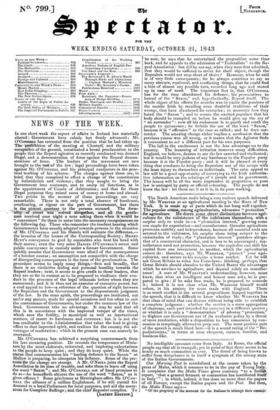The North American mails bring a very curious speech delivered
by Mr. WEBSTER at an agricultural meeting in the State of New York. It is made up of parts which do not bang well together. The popular orator, among agriculturists, advocates " protection" for agriculture. He draws some clever distinctions between agr cniture.for`the subsistence of the Cultivators themselves, with a surplus only to trade in—a " plantation interest," growing some one staple for exportation—and manufactures. Genuine agriculture promotes stability and independence, because all essential ends are secured to the cultivator, his surplus alone being subject to the vicissitudes of trade ; the "plantation interest" partakes altoge- ther of a commercial character, and is less to be encouraged ; ma- nufactures need not protection, because the capitalist can shift his capital from one investment to another, which the agriculturist cannot do : therefore, says Mr. WEBSTER, " protect " your agri- culturist, and secure to his surplus a home market. Yet he will ask Great Britain to relax her Corn-laws; thinking, perhaps, that Great Britain should abandon to the United States the advantages which he ascribes to agriculture, and depend solely on manufac- tures! A man of Mr. WEBSTER'S understanding, however, must know, that what an intelligent and honest man asks, he is pre- pared to give : if he asks free trade, he is prepared to concede it ; indeed it is not clear what Mr. WEBSTER himself would refuse, in his anxiety for more trade with England. There is so much conflict in the several propositions lumped together in the speech, that it is difficult to know whether Mr. WEBSTER has that class of mind that can discuss without being able to establish a complete judgment ; whether the oration is a mere aggregation of claptraps, each part intended for currency in a different quarter ; or whether it is only a " demonstration" of adverse "protection,' to frighten our Government out of its exclusive policy by a threat of more retaliation, while a disposition to buy concession by con- cession is temptingly allowed to peep out. The most positive part of the speech is much liked here—it is a sound rating of the " Re- pudiationists," in terms at once eloquent, earnest, familiar, and business-like.


























